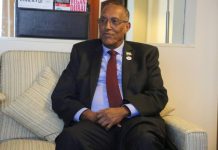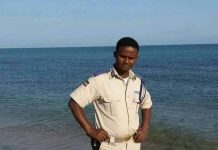Abdishakur Mohamoud didn’t get electricity until he was 11 years old. Now he’s bringing it to Somalia and other energy-starved nations.
Picture of kids with a light Rural families in Somalia and elsewhere can buy solar lanterns from Qorax on installments, aiding everything from cooking to warding off hyenas.
He grew up with no concept of electricity, walking miles along a dirt path each day to get kerosene for light and cooking. Then, at 11 years old, he got power at home for the first time. His family could afford only a single lamp.
“I thought electricity was like a luxury thing,” Abdishakur Mohamoud says. By the time he reached high school in northwest Somalia, he realized that the lack of access to the power grid was “a huge problem,” one that affected not just his family, “but all society and the economy as well.”
He set out to solve that problem—one that affects 1.3 billion people around the world, nearly half of them in sub-Saharan Africa. The company he co-founded, Qorax Energy, provides solar lights and home kits to rural customers in Somalia, the Democratic Republic of Congo, and soon, Ethiopia. The name, pronounced KO-rah, comes from the Somali word for “sun.”
Returning, and Rebuilding, After Years of War
Mohamoud spent his toddler years in Ethiopia as a refugee from Somalia’s civil war. His family returned to the region that would become Somaliland, the autonomous but internationally unrecognized state founded in 1991. They lived with three other families on his grandfather’s farm. The only light came from kerosene lamps. Getting fuel, clean water, medicine, and an education involved walking to a district more than four miles away.
Somalia and the DRC, still reeling from years of civil war, pose a special challenge when it comes to energy access. Would-be power customers have been focused on surviving and rebuilding. Somaliland is relatively stable compared to the rest of Somalia, Mohamoud says, but because of its history of conflict, “people have this wrong perception that they can’t really go in and help.”
After trying unsuccessfully to consult with power utilities on large-scale solar projects, he and the company’s American co-founders, Christian Nicolas Desrosiers and Nigel Carr, decided to go into the energy market themselves, with help from a Great Energy Challenge grant.
Early on, he says, they realized: “OK. We’re bringing products that people need, but can people really afford this?” They introduced a financing system in Somalia that lets customers pay with daily installments on their mobile phones. (In DRC, employees of hospitals and schools pay via a regular salary deduction.)
Mohamoud’s family eventually moved from the farm to Somaliland’s capital, Hargeisa, where his parents spent three years trying to make a living and renovate their war-ravaged house. The moment they got electricity, he recalls, was exciting.
“I still remember, it was a great thing,” he says. “But, actually, it was also the beginning of another problem.” The single light—out on the porch—wasn’t enough for the family’s needs, and it was expensive. His mother allowed Mohamoud, the second of six children, to use it only for studying: “We had all these restrictions.”
Mohamoud went to Abaarso Tech University in Hargeisa, where Desrosiers was one of his teachers. “He was an amazing student,” Desrosiers says, noting that in addition to his native Somali, Mohamoud can speak Arabic, Chinese, and English—enabling him to talk with both a rural customer at home and a supplier in China.
“He’s honestly one of the most impressive people I’ve ever met,” Desrosiers says.
Bad News for Hyenas
Today, Mohamoud’s home has more amenities: multiple lights, Internet, refrigerator, and other appliances. Electricity is still prohibitively expensive, though—about $1 per kilowatt hour (for comparison, the average price in the U.S. is 13 cents for the same amount).
He visits his home village and others to sell Qorax products, sometimes driving into mountainous regions with no roads, sometimes accepting animals as payment.
A light means something different in rural Somaliland: It can aid studying and cooking, but it can also deter hyena attacks on farm animals at night, or allow work on the land after the scorching temperatures have retreated for the day.
“Now, when I go to the communities, I’m really attached to everybody there,” he says, “Because I have been through that.”
Mohamoud says he would like Qorax eventually to offer clean cookstoves, which can cut the deadly smoke from old-fashioned cooking fires, and water pumps for farmers.
For the time being, funding and running the solar home power business is challenge enough. But Qorax’s founders see lots of potential, because they make a point of tailoring their approach based on what people in different regions need.
“If you really want to help someone,” Mohamoud says, don’t just say so. “Try to understand what their problem is. Try to see the world from their glasses.”
by Christina Nunez
Source: http://news.nationalgeographic.com/The story is part of a special series that explores energy issues. For more, visit The Great Energy Challenge http://news.nationalgeographic.com/energy/
























